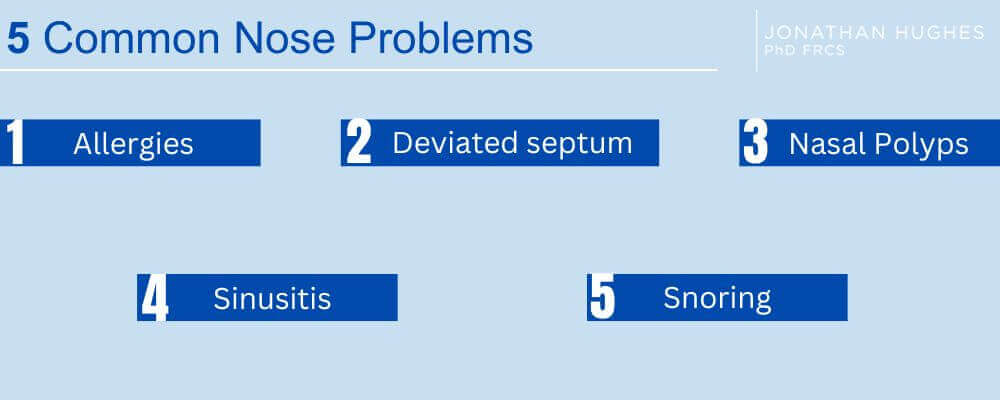As an ENT specialist in London, Jonathan Hughes helps patients in and around the capital with all kinds of ear, nose and throat disorders. Today, we’re focusing on the nose – and 5 common problems you may experience.

-
Allergies
Whether it’s pets, dust mites, hay fever or something else, allergies are becoming more and more common. Allergy UK, a charity, says that 44% of UK adults have an allergy – and of that group, half have a second allergy too.
Allergies can affect your nose in all kinds of ways, including itching; runny nose; sneezing; congestion; and sinus pressure. Treatments can include prescription nasal sprays, decongestants and medications.
-
Deviated septum
The septum is the fleshy ridge that divides your nostrils. But if that division isn’t equal – and one nostril is larger than the other – you may have issues. These can include congestion; breathing problems; sinus infections; headaches and nosebleeds; snoring; sleep apnoea; and postnasal drip. In cases like these, we would consider nasal surgery to correct the deviation and open up the nasal passages.
-
Nasal polyps
These are small growths, usually non-cancerous, that develop in the nostrils. You might find it difficult to breathe; suffer from constant runny noses and sinus infections; and develop pain in the nose or sinuses.
As an ENT specialist, Dr Jon Hughes might recommend nasal surgery to remove these polyps. Antihistamines and corticosteroid sprays can also be effective.

-
Sinusitis
This is a condition where your sinuses – a network of little passages inside the face – can become blocked and inflamed. It’s usually linked to colds and infections, with symptoms ranging from a blocked nose to facial pain, headache and affected sense of smell.
While drinking fluids, taking painkillers and using decongestant nasal sprays can help – and you can avoid triggers like smoke – sometimes, specialists suggest nasal surgery. This can help to remove blocked tissue or unblock the sinuses with a tiny balloon that can be inflated in the passages.
-
Snoring
Blocked or narrow airways in your nose can lead you to develop snoring. While it might seem like a harmless condition, snoring can affect your sleep and also links to sleep apnoea – which is a serious condition where your breathing stops and starts during sleep.
You can alleviate snoring with nasal devices such as strips and dilators which hold your nose open, but nasal surgery is the most permanent solution.
Book in with Jonathan Hughes
For specialist ENT surgery, including nasal surgery, talk to our London team today and schedule a consultation.
